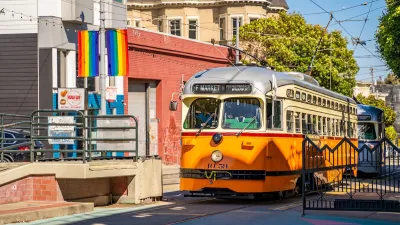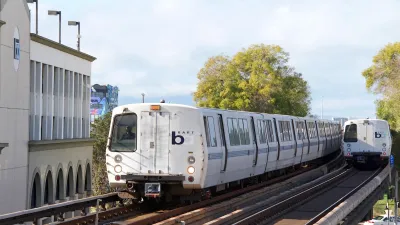Ryan Holeywell discusses a new report from researchers at the University of California, Berkeley that examines the top reasons people stop using public transit. Frequent, consistent service is most important to riders.
Findings presented this week at the Transportation Research Board's annual conference in Washington, D.C. may provide guidance for transit agencies trying to balance increases in ridership with strained budgetary environments. "While it's well-known that reliability is important to riders," says Holeywell, "it's less understood how, exactly, common transit problems impact the public's likelihood to reduce their ridership in the long-term."
So, in surveying public transit riders in the San Francisco area, the Berkeley researchers sought to dig deeper into the causes of "unreliability", and how they effect the mindset of riders.
"Frequent, consistent service -- and in particular, reliable transfers between stops -- are what's most important to riders, according to the study. Riders care most about getting picked up from their stop in 10 minutes or less, and they especially value being able to make their scheduled connections. They're not so interested in whether their rides are crowded or whether they can find a seat."
"But a few key things in particular irk passengers: delays that occur once they board a vehicle and delays when they're trying to make a transfer. Delays at transfer stops were more than twice as likely to make someone reduce their transit use than a delay at the point of origin. Riders were especially turned off by delays due to operational problems like backups in the system."
"At a time when transit agencies continue to take budgetary hurdles," concludes Holeywell, "the insights from the study are worth considering. Since certain failings have much larger impacts on ridership than others, it may be in public transportation agencies' best interest to focus resources on minimizing those inconveniences in particular."
FULL STORY: Top Reasons People Stop Using Public Transit

Trump Administration Could Effectively End Housing Voucher Program
Federal officials are eyeing major cuts to the Section 8 program that helps millions of low-income households pay rent.

Planetizen Federal Action Tracker
A weekly monitor of how Trump’s orders and actions are impacting planners and planning in America.

Ken Jennings Launches Transit Web Series
The Jeopardy champ wants you to ride public transit.

Rebuilding Smarter: How LA County Is Guiding Fire-Ravaged Communities Toward Resilience
Los Angeles County is leading a coordinated effort to help fire-impacted communities rebuild with resilience by providing recovery resources, promoting fire-wise design, and aligning reconstruction with broader sustainability and climate goals.

When Borders Blur: Regional Collaboration in Action
As regional challenges outgrow city boundaries, “When Borders Blur” explores how cross-jurisdictional collaboration can drive smarter, more resilient urban planning, sharing real-world lessons from thriving partnerships across North America.

Philadelphia Is Expanding its Network of Roundabouts
Roundabouts are widely shown to decrease traffic speed, reduce congestion, and improve efficiency.
Urban Design for Planners 1: Software Tools
This six-course series explores essential urban design concepts using open source software and equips planners with the tools they need to participate fully in the urban design process.
Planning for Universal Design
Learn the tools for implementing Universal Design in planning regulations.
Ada County Highway District
Clanton & Associates, Inc.
Jessamine County Fiscal Court
Institute for Housing and Urban Development Studies (IHS)
City of Grandview
Harvard GSD Executive Education
Toledo-Lucas County Plan Commissions
Salt Lake City
NYU Wagner Graduate School of Public Service




























